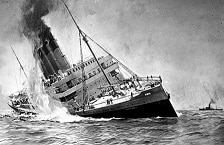In Latin is where we can find the etymological origin of the term shipwreck that concerns us now. Specifically, it emanates from the word "naufragium", which is the result of the sum of several lexical components of that language:
-The noun "navis", which can be translated as "ship" or "boat".
-The root "frag", which emanates from the verb "frangere", which is synonymous with "break".
The term refers to the sinking of a ship in a navigable body of water.
Among the words that can function as synonyms for shipwreck, in addition to those already indicated, we can highlight flooding, sinister and even immersion.
 The act and result of the disappearance or destruction of the vessel is called a shipwreck. The concept is also used to refer to the ship that sank.
The act and result of the disappearance or destruction of the vessel is called a shipwreck. The concept is also used to refer to the ship that sank.
Shipwrecks can occur for multiple reasons. Many times the ship ends up sinking as a result of some weather factor, such as a storm or hurricane . In these cases, the boat can tilt until it turns over and loses its buoyancy.
Another possibility is that the waves cause the ship to hit rocks or other solid objects. If the impact punctures the hull, the entry of water can end up causing the shipwreck. Collision against rocks or against another vessel due to human error is another probable cause of shipwreck.
Shipwrecks, on the other hand, are usually one of the consequences of a war or an armed attack of another type. A ship that is hit by a torpedo or a missile , to name two possibilities, is very likely to capsize.
The Titanic shipwreck is one of the most famous in history . This liner collided with an iceberg on the night of April 14, 1912 , during its maiden voyage. The gigantic ship then broke in half. As a result of the shipwreck, more than 1,500 people lost their lives.
In times of war , meanwhile, a well-known shipwreck is that of the Musashi , a Japanese battleship destroyed in World War II . Its sinking occurred on October 24, 1944 , leaving more than 1,000 dead .
In addition to those already mentioned, there are other important shipwrecks throughout history such as these:
-In the year 1820, a whaling ship called Essex, headed by George Pollard Jr., was shipwrecked when it was hit by a large sperm whale. That happened about 3,700 kilometers off the coast of South America and this event inspired Herman Melville to shape his famous work "Moby Dick" (1851).
-In 1915 the largest ocean liner in history up to this point was the Lusitania and at that time it was shipwrecked. He did so in Atlantic waters after having been torpedoed by a German submarine that he believed was carrying weapons. This event resulted in the loss of almost 1,200 people.
-In 1941 the German battleship Bismarck suffered a shipwreck after being torpedoed by British ships while sailing off the Scandinavian coast. Of the 2,200 men who were on board, only 114 managed to survive.
